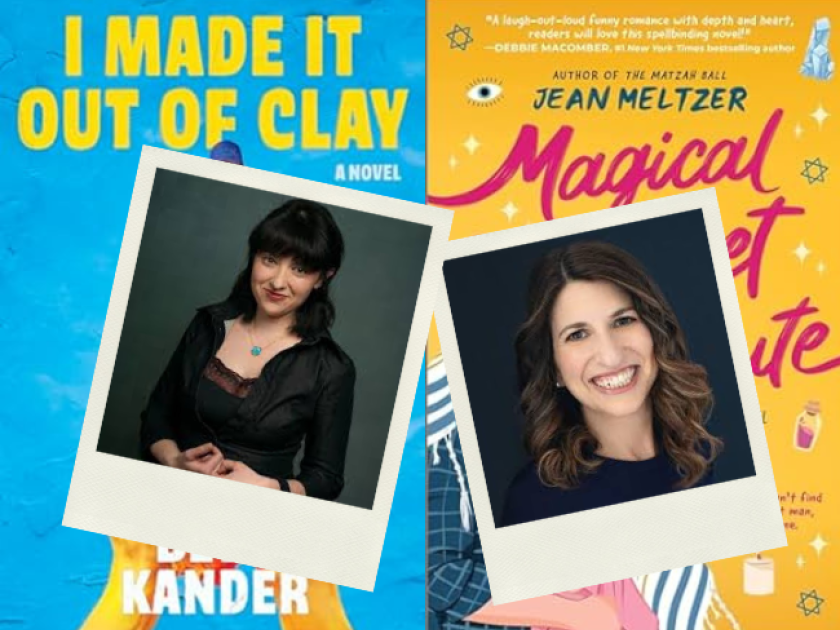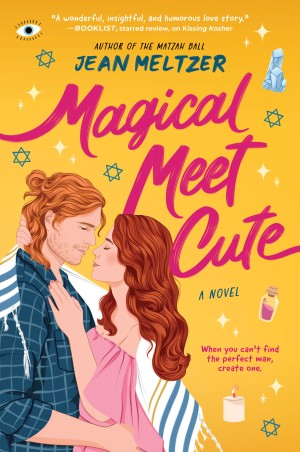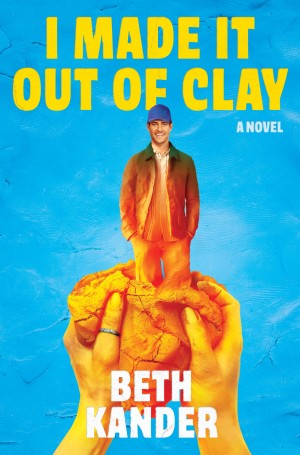
Jean Meltzer is the Queen of Jewish Romance, an internationally bestselling author, and founder and CEO of The Jewish Joy Book Club and The Jewish Joy Box. Her fourth book, Magical Meet Cute, came out this August. Beth Kander is a playwright whose debut novel, I Made It Out of Clay, will be released this December. In this conversation, the authors discuss golems, grief, magic, and what it means to claim one’s own stories.
Beth Kander: Jean! I feel like our meet-cute was on Instagram. We were online cheerleaders for each other for a solid year or two before finally connecting more recently over Zoom. I truly appreciate the stories you share, the way you champion your fellow authors and emphasize Jewish joy. We’re both writing the stories we want to see in the world, which feels special. I was especially intrigued when I heard about your latest novel, Magical Meet Cute.
Jean Meltzer: Yes, same! I was so excited to hear about your book, I Made It Out of Clay, and was thrilled when I was able to snag an advance copy. I was immediately drawn to your heroine, Eve. When we first meet Eve, she’s struggling. She’s reeling from the death of her father, and distraught over turning forty and being single — while her little sister is getting married! But although Eve begins this book in a very dark place emotionally, it’s actually a very comedic story overall. I love her reactions to her neighbor “Hot Josh,” her friendships, and, of course, her eventual creation of the golem. What inspired you to write this story? Was it a conscious choice to write a dark comedy about grief and golems?
BK: My book actually started as a movie pitch — “Broad City meets Sean of the Dead, at Hanukkah” — which is 100 percent a movie I’d love to see. I love rom-coms, but I also love things that are a little weird. Clever stories with unexpected twists … like, you know, a lonely woman deciding that the best solution to her problems is to make a golem rather than, oh, say, go to therapy. (And the golem/Hanukkah mash-up is where the title came from, of course — a wicked little “spin” on a classic holiday melody!) I Made It Out of Clay won the Hey Alma Hanukkah Movie Pitch Competition in 2022. To my shock, film producers started reaching out to me about actually making this movie, and that’s when my incredible agent, Allison Hellegers, gave me some really solid advice: “Write it as a book first.” To be honest, I didn’t start with much beyond the big idea of “a funny, weird, kinda deep tale of a woman making a golem and things going horribly awry.” As soon as I started writing, though, I added the element that she was mourning her father, and that she and her sister and mother had never truly reckoned with the loss. Eve is mostly managing to hold it together, but when a few other things in her life start unraveling and her little sister’s big wedding is looming, the whole house of cards falls apart. When we don’t attend to our grief, it can become a monster — in this case, literally. The more I wrote, researched, and revised, the more I saw parallels between the creation of the golem and the difficulty of navigating loss, past, present, and future. Golems are the embodiment of Jewish anxiety. I became completely obsessed with them, and who might make them, and why.
Which is why when I heard about Magical Meet Cute, I was so intrigued. At a glance, our books sound similar — but they’re so different! Magical Meet Cute is a delightfully upbeat and distinctly Jewish rom-com. Your main character, Faye, is anxious about recent antisemitic papering in her neighborhood. The morning after conducting some (no spoilers) rituals, she hits a good-looking redheaded guy with her bicycle, he gets amnesia, and she soon starts wondering if he’s a golem of her own making. It has classic rom-com vibes but also weaves in serious themes like antisemitism and childhood abuse. I love that Faye isn’t your typical Jewish leading lady … especially because she identifies as a “Jewitch.” That’s what hooked me most, and what I think is going to hook so many readers. Can you talk a little bit about why you wanted to write a rom-com about a Jewitch and a golem?
JM: I love how you described Magical Meet Cute as “delightfully upbeat and distinctly Jewish”! One of my favorite things about being the Queen of Jewish Romance is that I’m able to take familiar romantic tropes and hooks and retell those narratives through a Jewish worldview. Witch rom-coms are extremely popular in traditional romance. But while many people consider those books secular, they’re actually written from a Christian perspective. For example, there are demons making bargains with Satan, swoony lovers rising up from the depths of hell … all things that, as it turns out, aren’t very Jewish. I wanted to be the first author of a traditionally published rom-com to write a witch romance through a Jewish lens. I did about fifteen months of research into Jewish myth and magic to create a textually accurate Jewitch romance.
Yes, this is a complicated time to bring Jewish stories into the world. But I also think it’s an incredibly important time to bring Jewish stories into the world — especially ones that show the full humanity of Jewish characters.
I had wanted to write a book about antisemitism for some time. After my first book, The Matzah Ball, was published, I became the victim of a Goodreads review-bombing campaign, and my husband and I were both harassed online. I already knew I wanted to write a Jewitch romance, and so it was an easy leap from there to Jewish folklore. The golem seemed like the perfect vehicle for exploring antisemitism in our world today. Beth, your book also touches on antisemitism. Why did you want to talk about it? Did you have any fears about publishing a Jewish book in a post – October 7th world?
BK: Ugh, I hate to hear that The Matzah Ball was review-bombed and you and your husband were trolled. That’s gross, and I’m so sorry you had to deal with that. (Side note for anyone who wants to see authentic and heartfelt chronic disability representation in a Jewish romance: pick up The Matzah Ball!) Yes, this is a complicated time to bring Jewish stories into the world. But I also think it’s an incredibly important time to bring Jewish stories into the world — especially ones that show the full humanity of Jewish characters. Our humor, our love, our loyalty, our screw-ups. I wrote this book in 2022, so it’s not a response to more recent tragedies, but it’s absolutely a response to the omnipresent reality of antisemitism and the danger of letting fear overtake us.
A few years before I wrote this story, several garages in my neighborhood in Chicago were spray-painted with swastikas and anti-Jewish rhetoric. It wasn’t my first experience with antisemitism, but it was my first encounter with it after becoming a parent. I was gutted, and scared in an entirely new way. I didn’t even want to leave the apartment. But my husband and I took our then two-year-old with us to a local Rally Against Hate organized that very same week. Hundreds of my neighbors gathered, and I was just crying the whole time, seeing the solidarity in our diverse and devoted community that morning. It gave me hope for my kids, and for all of us. It made me realize we don’t have to face these things alone — which is what Eve comes to understand in I Made It Out of Clay.
For me, the most meaningful thing about both of our stories is that they don’t just center fear, anxiety, or trauma; they emphasize laughter, friendship, and a fierce belief in claiming not only our own stories but also our own joy. Which also makes both books FUN to read! Jean, can you share a little about why you think Jewish books with happy endings are important? And also maybe even mention your Jewish Joy Box, *nudge nudge wink wink*?
JM: Oh, I could talk forever about this topic! But really, it’s more than just writing a Jewish book with a happy ending. Rather, it’s about showcasing entire narratives in which Jews are the heroes of their own story. And the reason I have made Jewish joy the center of my life’s work and mission is simple. Growing up, I didn’t have many positive female Jewish role models in fiction — or even stories that celebrated Jewish life.
Instead, most of the stories I had were Holocaust narratives, stories that presented Jews as victims, people needing to be saved, often by non-Jewish characters. When they weren’t being murdered, Jewish women were side characters. The wise best friend with frizzy hair and a big nose, or the comic relief, but never a person deserving of their own story.
It was even worse in terms of finding chronic illness representation. I was diagnosed with ME/CFS in 1998, a disease that robbed me of normalcy and left me homebound for over a decade. But what made the diagnosis particularly difficult is that I had no role models. I had no heroines in the media, no stories of women who managed love, their careers, or parenting children while chronically disabled. There is so much power in seeing yourself as the hero in your own story.
I know this because ever since I published The Matzah Ball, I have been inundated with emails and messages. One reader told me that seeing a proud Jewish woman on the page changed the way they felt about their own Jewish identity. Countless others, Jews and non-Jews alike, have written that my books have allowed them to find access points into their own spirituality. Readers living with chronic illness have shared with me that after reading my book, they finally had the courage to use a wheelchair, or realized that they, too, are deserving of safe and healthy love. More than one person has told me that my books have saved their life.
It was because of these messages that I truly began to understand the importance of the stories I was writing. I wasn’t just fighting for me; I was fighting for my readers. I was fighting for all the books that celebrated Jewish life. And, perhaps more important: as the Queen of Jewish Romance, I was fighting for all the Jewish authors of Jewish joy that would come after me.
I have always been an advocate, and so, despite my disability, for years I hopped on planes and traveled the US taking on speaking engagements, meeting with everyone from small synagogue book clubs to Fortune 500 companies such as Google. When that reach didn’t feel far enough, I launched a Facebook group: Jewish Women Talk About Romance Books. And after October 7th, when our online group was inundated with readers seeking safe spaces, I got to work again. I created the Jewish Joy Book Club and The Jewish Joy Box, the first Jewish subscription book box.
In less than a year, Jewish Joy LLC has grown to over two thousand members and sold out of our first round Jewish Joy Boxes. We’re now expanding subscriptions for orders of The Jewish Joy Box in 2025, planning our first in-person events, and starting the paperwork to create a Jewish Joy Con in 2026. All of these endeavors I have built from my own home, with my own money, while being chronically disabled.
Yet despite the risk to both my bank account and my health, I do it because I love it. Because it’s my passion. And because I know with all my heart that this work is important. We’re not just writing Jewish books with happy endings — we’re building a Jewish joy movement.
Speaking of Jewish joy, I’d love to know what you are working on next, Beth. Can we expect more novels that bring us feisty and lovable Jewish heroines?
BK: Yes! I’m working on a dual-POV/dual-era Sherlock Holmes book called Always the Woman. I can’t say too much about it right now, but in Sir Arthur Conan Doyle’s Holmes stories, the one person who ever bested Sherlock Holmes was a woman, Irene Adler. And Irene is canonically Jewish, which is what initially inspired me to tackle this story. The contemporary storyline weaves in a lot of the places I’ve called home, while the historical storyline is going to give me plenty of excuses to visit my favorite city, London. Getting to play with two extremely independent, smart women in two different eras, and trying to solve two different mysteries, is so much fun. I can’t even tell you how excited I am about this next project, and I can’t wait to share more about it soon.
Can I ask what’s next from the Queen of Jewish Romance?
JM: Absolutely! I’m so excited to announce that for the five-year anniversary of The Matzah Ball, I will be writing another Hanukkah rom-com! The Eight Heartbreaks of Hanukkah, tentatively titled, is my very Jewish retelling of Charles Dickens’s A Christmas Carol. This book is extremely special to me, but otherwise, I don’t want to give away too many spoilers. You’ll be able to snag a copy yourself on October 25th, 2025. Of course, preorders are always appreciated! And don’t forget to talk to your libraries!
Jean Meltzer studied dramatic writing at NYU Tisch and has earned numerous awards for her work in television, including a daytime Emmy. She spent five years in rabbinical school before her chronic illness forced her to withdraw, and her father told her she should write a book — just not a Jewish one because no one reads those. The Eight Heartbreaks of Hanukkah is her fifth novel.
Beth Kander has an MSW from the University of Michigan and an MFA in Creative Writing from Mississippi University for Women. An award-winning playwright, she’s a lifelong theatre kid and a Dramatists Guild Foundation National Fellow. Beth authored the popular children’s book Do Not Eat This Book!: Fun with Jewish Foods & Festivals. Her debut novel for grown-up readers, I Made It Out of Clay, hits shelves December 10, 2024. To learn more, you can visit Beth’s website or follow her on Instagram or Facebook. She hopes to visit many JBC communities, and would also be endlessly grateful if you preordered I Made It Out of Clay.



